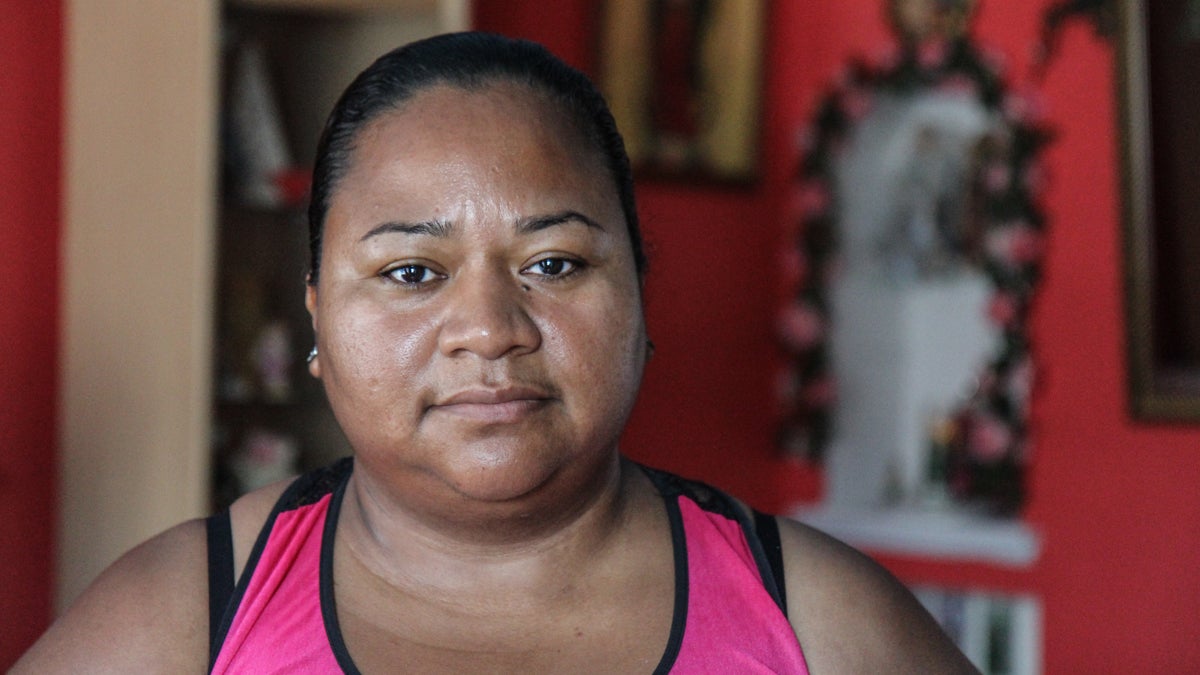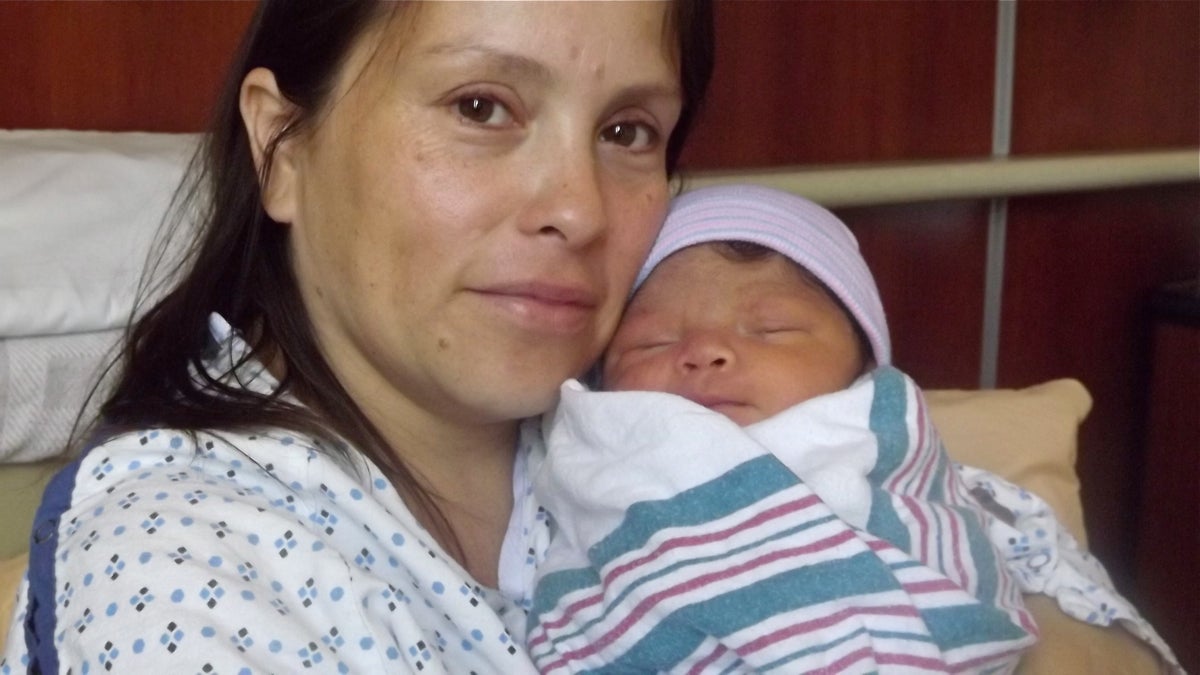Fear, cost keep undocumented immigrants from health care
Listen
Estela entered the United States from Oaxaco
Immigration-reformers question benefits for U.S.-citizen children of undocumented immigrants.
Alexa is 11. Her brother Marcos—the one with the quick, wide smile–is six. William—who seems a bit shyer—is nine.
All three are North Philadelphia kids, but there’s a difference.
Alexa was born in Mexico. The boys were born in the United States.
Their mom, Estela, says that factor sometimes gets in the way of health care for Alexa.
“I have to pay for everything every time I go, it’s $25, so if she needs a vaccine, I have to pay $25. On the other hand if I take my sons to Temple [a hospital-affiliated health clinic] to get their vaccines, it’s covered and I don’t have to make an appointment,” she said.
This is a mixed-status family. The boys are citizens. Estela, her husband, and daughter entered the United States illegally. They want to talk about how hard it is to find health care but Estela asked that we only use first names. She spoke through a translator.
The boys are enrolled in Medicaid. Estela takes Alexa to Maria de los Santos Health Center, a federally funded clinic that considers the family’s income to figure out how much to charge.
Alexa is all elbows and knees like lots of beautiful middle-school girls. She wears those black-frame hipster glasses and a Hannah Montana bracelet. The doctor found early signs of diabetes during her school physical.
But, seeking healthcare sometimes takes a backseat to other living expenses, Estela said. The last medical bill for Alexa was $800.
“My landlord isn’t going to wait,” she said.
Estela’s husband works the nightshift cleaning supermarket floors and earns about $1,600 a month. Estela says the rent, lights, gas and water bills add up to $1,500.
In the kitchen, Estela is making a traditional Oaxaca lunch called entomatadas. It’s tortillas made by hand and dipped in tomato sauce to absorb spice and juice. Later, she’ll top the dish with onion, meat and cheese.
The perfume of chilies sizzling in a pan makes your eyes water.
Everyone in the family is making healthier choices since they started working to regulate Alexa’s blood sugar.
“We really restricted fats, sugar, sodas, in my house we don’t drink any soda,” Estela said.
In addition to Alexa’s medical expenses, Estela has a $2,000 bill from a recent trip to the emergency room. She says she has friends who avoid interactions with the health care system.
“Many people are afraid because the first thing that happens when you go to the hospital is they’ll ask for a green card or identification,” Estela said.
Fear of deportation
This month, a Mexican woman in Texas was ushered to an exam room at her gynecologist’s office and arrested. The patient had overstayed her visa years before and when she presented false identification at reception, staffers alerted police. Now there are questions about medical ethics, patient privacy and document fraud.
Incidents like that make the news because they are unusual. But immigrant-rights advocates say that for people living in the United States without permission, those stories provoke anxiety and reinforce the perception that seeking health care can get you booted out of the country.
Nicole Kligerman, an organizer with the immigrant-justice group the New Sanctuary Movement of Philadelphia, said fears about deportation mean some undocumented immigrants only seek ‘sick care’ at the emergency room, not ‘health care.’
“You can walk away with tens of thousands of dollars in medical debt,” Kligerman said.
Estela said she has had help from doctors and nurses to navigate the health care system. “There are as many good people as those who discriminate against us,” she said.
But not everyone has the same luck, and she wants policy changes. For example, she said a driver’s license could pave the way to better health care.
Estella is an activist. She’s testified at the state capitol in Harrisburg and says Alexa and other kids like her daughter should be included in the federal Children’s Health Insurance Program.
After surveying families, a June report from the Pennsylvania non-profit Public Citizens for Children and Youth makes the case that the cost of paying medical centers for providing uncompensated healthcare to the children of undocumented immigrants is more expensive to the government than the cost of insuring them.
Opposing views
Unauthorized immigrants aren’t eligible for Medicaid and they don’t qualify for private-insurance subsidies through President Obama’s health law.
There are about 11 million foreign nationals in the U.S. without permission.
Ira Mehlman, media director of the Federation of American Immigration Reform, says the U.S. rules for them are already too relaxed.
“We shouldn’t be dealing with immigration at the door to the emergency room or the schoolhouse door,” Mehlman said. “The best way to deal with illegal immigration is to discourage people from coming to the country in the first place.”
Many U.S. citizens don’t have the care they need, he said.
Some research suggests that undocumented immigrants—possibly because they are typically younger and healthier–use fewer medical services and cost the healthcare system less than other groups in relation to their population.
“Just because they are less likely to show up in the E.R. doesn’t mean that the bills they rack up aren’t high, or that those should be born by the taxes of American citizens,” Mehlman said.
Immigration-reform groups are looking for ways to scale-back health-spending and other benefits for undocumented workers and their families. One strategy is a debate over the 14th Amendment and birthright citizenship.
Republican front-runner Donald Trump is leading the debate and talked about the issue recently on Fox News with Bill O’Reilly.
The Federation of American Immigration Reform has estimated that the country spends $113 billion each year on “illegal immigrants.”
That analysis controversially includes expenses for the U.S.-citizen kids of undocumented immigrants. But Trump and others are also questioning that long-standing idea: that a child born here to an undocumented worker is automatically a citizen.
While that debate heats up, opponents say the U.S. citizen children of immigrants are one very good reason to provide better health care for their parents.
Baby Allen was born this month. His mom arrived in Philadelphia from Honduras eight years ago. She asked that we not use her name.

Baby Allen was born healthy this month at Pennsylvania Hospital. His mom is from Honduras and living in the U.S. illegally. She has diabetes and required intensive prenatal care in the months before his birth. (Taunya English/WHYY)
She was diagnosed with diabetes very early in her pregnancy and was sick enough that she needed check-ups twice a week. She got outpatient care through the Latina Community Health Services held at Pennsylvania Hospital.
Before that, she says it had been five years since she had medical care—when she gave birth to her last baby.
The hospital’s chair of obstetrics and gynecology Jack Ludmir says his clinic is a safety net for thousands of migrants from Mexico and more recently Guatemala and Honduras.
The fetus of a mom with diabetes faces big health risks. But Ludmir says baby Allen arrived healthy, and Allen’s mom is healthy, too.
“By providing prenatal care I avoid complications, and when the baby is born it’s an American citizen that now qualifies for CHIP,” Ludmir said.
He has lots of critics, he said.
“There are some lawmakers—in particularly in the House of Representatives at the state level—that feel that clearly I’m committing a felony, that I’m committing a felony because quote-unquote I’m helping criminals,” Ludmir said.
The Maria de los Santos Health Center and other federally funded clinics give care to people who can’t get it other places, regardless of their status.
Patti Deitch, CEO of Delaware Valley Community Health an umbrella group for several health centers, says that’s her mission even in the middle of a contentious political season.
“I have been able to maintain what we are doing without being in the middle of any political arguments about what people should or shouldn’t have,” Deitch said. “I don’t think I can answer that: ‘if undocumented people should have Medicaid,’ but they should have health care.”
Thanks to WHYY’s Elisabeth Perez-Luna for help with this story.
WHYY is your source for fact-based, in-depth journalism and information. As a nonprofit organization, we rely on financial support from readers like you. Please give today.



